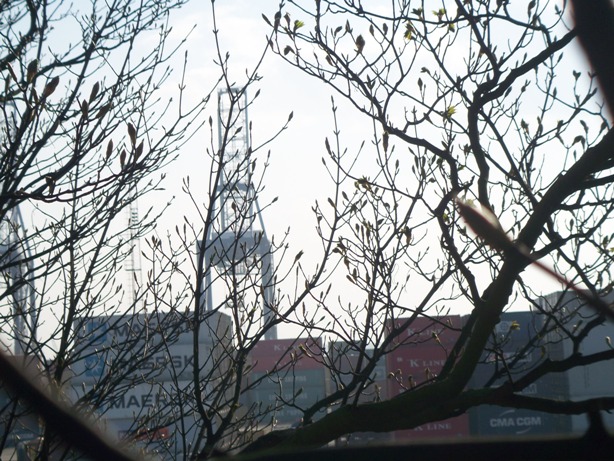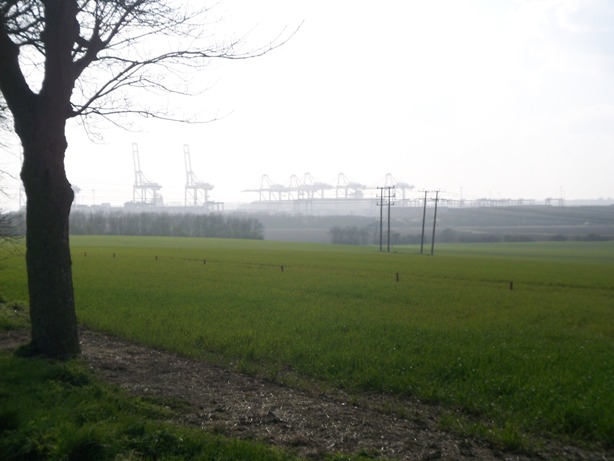April 10, 2009
Anticapital after containerisation

A belated response to the Insitute's remarks on the G20 protests. Firstly, the Institute is certainly right: the interview with David Harvey at Red Pepper is essential reading, but Harvey's argument about the "right to the city" - "in the last 30 years an immense amount of the capital surplus has been absorbed into urbanisation: urban restructuring, expansion and speculation. Every city I go to is a huge building site for capitalist surplus absorption" - make a case for something like a systematic campaign against the London 2012 Olympics rather than the inchoate petitions of last week. I maintain that sabotaging the 2012 PR/ development programme is eminently realistic, in part because any campaign could draw upon a sense of discontent that spreads far beyond the regular constintuencies of opposition to capital, yet this struggle inevitably engage issues of development, about who owns the city and what use it can be put to.
A word of clarification. I didn't privilege the factory occupations over the G20 because they involved labour, but because the occupation strategy has a potential to move beyond the logic of protest. Where protest by its very nature awaits recognition from a big Daddy Other that it, in an obvious Hegelian reversal, grants recognition to, the occupation can refuse recognition not only of the big Other, but also of the system of property that it represents. The occupation seizes space and forces power to act if it wants to reclaim it.
Naturally, I wholeheartedly endorse Savonarola's remarks on trade unions. It's difficult to see how even extremely limited reformist goals could be achieved via political parties, but unions have the required "transversality" to be effective. This would of course require a change in orientation, strategy and thinking, however since, even after thirty years of Post-Fordism, unions remain fixated on Fordist objectives and methodologies. My experience of union meetings though is that there is a vast reservoir of libido waiting to be tapped; at meetings, there was an animated disaffection with auditing and new bureaucracy which immediately dissipated when the 'official' agenda - pay and strikes - was dutifully returned to.
New forms of industrial action need to be instituted against managerialism. For instance, in the case of teachers and lecturers, the tactic of strikes (or even of marking bans) should be abandoned, because they only hurt students and members (at the college where I used to work, one-day strikes were pretty much welcomed by management because they saved on the wage bill whilst causing negligible disruption to the college). What is needed is the strategic withdrawal of forms of labour which will only be noticed by management: all of the machineries of self-surveillance that have no effect whatsoever on the delivery of education, but which managerialism could not exist without. Instead of the gestural, spectacular politics around (noble) causes like Palestine, it's time that teaching unions got far more immanent, and take the opportunity opened up the crisis - their crisis, our opportunity, as Harvey rightly characterises it - to begin to rid public services of business ontology. (When even businesses can't be run as businesses, why should public services?)
Containers and their drivers
Harvey's comments on containerisation, echoed and expanded by No Useless Leniency, have a special piquancy for me now that we live in such close proximity to one of the largest container ports in Europe. The fact that one of one of the "exposed nerve cables of global capital" (as Scanshifts put it) should be here, in the town that MR James used as the setting for "Oh Whistle And I'll Come To You My Lad", and next to the Zone-like Landguard common, with its abandoned fort and pillboxes, makes for a cybergothic incongruity. Seen from the town, the port's cranes tower above the Victorian resort like H G Wells' Martian Tripods. Approached from Trimley marshes, the cranes loom over the countryside like gleaming cybernetic dinosaurs erupting out of a Constable landscape. The immensity of the port's "unvisited vastness" is not capturable in any photograph.
There's an eerie sense of silence about the port that has nothing to do with actual noise levels. What's missing are the traces of any human activity. Watching the container lorries and the ships do their work, or surveying the containers themselves, the metal boxes racked up like a materialised version of the bar charts in Gibson's cyberspace, their names ringing with a certain transnational, blank, Ballardian poetry - Maersk Sealand, Hanjin, K-line - one never has any sense of human presence. I'm reminded instead of the mute alien efficiency of the pod distribution site in Philip Kaufman's 1978 version of Invasion Of The Body Snatchers. The contrast between the container port, in which humans are invisible connectors between automated systems, and the spectacular clamour of the London protests (and indeed of the old London docks which the port of Felixstowe effectively replaced) tells us a great deal about the shifts of capital and labour in the last forty years.

The spectral cranes of Felixstowe port, as seen from Trimley Marshes
As Ben mentions, containerisation famously features in the second season of The Wire (which, I confess, I still haven't seen), but containers are also central to one of the most eerie scenes in I, Robot. The herding of decommissioned robots into containers is a poigant image of the obsolescence of labour, taking place in one of the very sites - a container park - which has made that obsolescence possible.
Posted by mark at April 10, 2009 04:45 PM | TrackBack